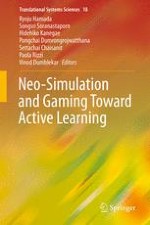2019 | OriginalPaper | Buchkapitel
Methodology for Environmental Learning Based on Material Flow Diagram of Green Multidimensional Bookkeeping System
verfasst von : Keiko Zaima
Erschienen in: Neo-Simulation and Gaming Toward Active Learning
Verlag: Springer Nature Singapore
Aktivieren Sie unsere intelligente Suche, um passende Fachinhalte oder Patente zu finden.
Wählen Sie Textabschnitte aus um mit Künstlicher Intelligenz passenden Patente zu finden. powered by
Markieren Sie Textabschnitte, um KI-gestützt weitere passende Inhalte zu finden. powered by
